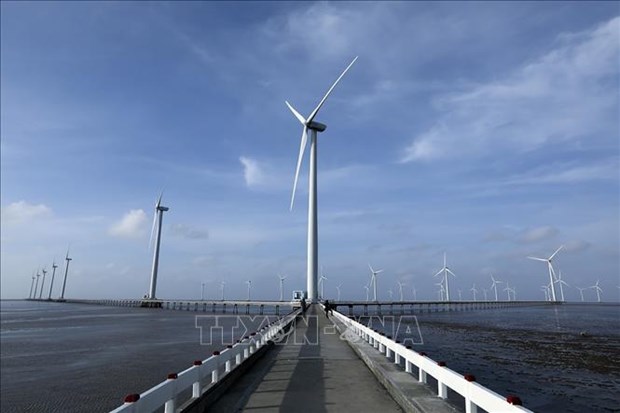
The National Power Development Plan VIII is considered a breakthrough in the energy sector. (Photo: VNA)
Hanoi (VNA) – Experts on July 28 proposed measures to avoid problems and effectively implement the National Power Development Plan VIII, which was approved in mid-May, at a seminar on mechanisms, policies and solutions to ensure sustainable energy with a vision to 2050.
One problem with the previous plan was that many projects were behind schedule and were delayed coming online to the national grid, causing problems in energy security.
Nguyen Anh Tuan from the Vietnam Energy Association said that the slow progress of power projects is one of the main reasons leading to difficulties in power supply.
Prof. Le Chi Hiep from Ho Chi Minh City University of Technology stressed the need to build a specific roadmap for each period, with stricter inspection and monitoring.
Many participants agreed that the orientation of solar self-consumption development in the new plan is sound, but it is necessary to specify the concept, scale of development, and connectivity, especially in industrial parks and clusters.
Regarding offshore wind power development, they stressed the need to consider the issue of national sovereignty as the situation of buying and selling projects back-and-forth between units may occur.
Especially, for important projects, it is necessary to have a strict supervision regime from the Government to the Ministry of Industry and Trade to avoid major, year-long delays.
The Government should assign the Ministry of Industry and Trade and relevant ministries to develop a bidding mechanism to invest in renewable energy power projects, so as to choose contractors with sufficient capital, and technical staff, they said.
The National Power Development Plan VIII is considered a breakthrough in the energy sector as it shows Vietnam’s determination to gradually eliminate coal-fueled and gas-fired power generation and promote renewable energy to achieve the target of net zero emissions by 2050.
Under the plan for the 2021 - 2030 period with a vision to 2050, only the coal-fired power projects listed in the adjusted Plan VII and those currently under construction will be continued, and there will be no new coal-fired power projects after 2030.
Vietnam targets that by 2050, coal will no longer be used for power generation but biomass and ammoniac instead. Coal-fired power plants aged over 40 years will be closed if they are unable to switch to other fuels.
Meanwhile, renewable energy will receive special priority, expected to account for some 70% of all electricity generation by 2050. Rooftop solar power for self-use will also be facilitated to cover 50% of the roofs of office buildings and civil houses./.